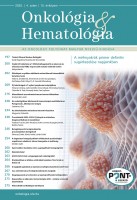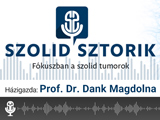Szerző:
Constantine S. Tam, MBBS, MD1
Tanya Siddiqi, MD2
John N. Allan, MD3
Thomas J. Kipps, MD, PhD4
Ian W. Flinn, MD, PhD5
Bryone J. Kuss, MBBS, PhD, FRACP, FRCPA6
Stephen Opat, FRACP, FRCPA, MBBS7
Paul M. Barr, MD8
Alessandra Tedeschi, MD9
Ryan Jacobs, MD10
Xavier C. Badoux, MBBS, FRACP, FRCPA11
Paolo Ghia, MD, PhD12
Juthamas Sukbuntherng, PhD13
Ahmed Hamed Salem, PhD, FCP14
Kristin Russell, BS15
Karl Eckert, BA16
Cathy Zhou, MS17
Joi Ninomoto, PharmD18
Danelle F. James, MD, MAS19
William G. Wierda, MD, PhD20
1St. Vincent's Hospital and University of Melbourne, Peter MacCallum Cancer Centre, Melbourne, Australia
2City of Hope National Medical Center, Duarte, CA
3Weill Cornell Medicine, Long Island City, NY
4UCSD Moores Cancer Center, San Diego, CA
5Sarah Cannon Research Institute/Tennessee Oncology, Nashville, TN
6Flinders Medical Centre, Bedford Park, Australia
7Monash University, Clayton, VIC, Australia
8Wilmot Cancer Institute, University of Rochester Medical Center, Rochester, NY
9ASST Grande Ospedale Metropolitano Niguarda, Milan, Italy
10Department of Hematology, Lymphoma Division, Levine Cancer Institute, Charlotte, NC
11Ministry of Health, St George Hospital, Kogarah, Australia
12Università Vita-Salute San Raffaele and IRCCS Ospedale San Raffaele, Milan, Italy
13Pharmacyclics LLC, an AbbVie Company, Sunnyvale, CA
14AbbVie, North Chicago, IL
15Pharmacyclics LLC, an AbbVie Company, Sunnyvale, CA
16Pharmacyclics LLC, an AbbVie Company, Sunnyvale, CA
17Pharmacyclics LLC, an AbbVie Company, Sunnyvale, CA
18Pharmacyclics LLC, an AbbVie Company, Sunnyvale, CA
19Pharmacyclics LLC, an AbbVie Company, Sunnyvale, CA
20University of Texas M.D. Anderson Cancer Center, Houston, TX
Background: Ibr is the only once-daily inhibitor of Bruton tyrosine kinase with significant overall survival benefit demonstrated in 2 randomized phase 3 studies in first-line CLL (RESONATE-2; ECOG1912). Both Ibr and Ven, an oral inhibitor of BCL2, are approved in the US for treatment of CLL/SLL. The combination of Ibr + Ven may have synergistic anti-tumor activity given the capacity of Ibr to mobilize CLL cells from protected niches within ...
Szerző:
Paul M. Barr, MD1
Alessandra Tedeschi, MD2
Talha Munir, MD3
Peter Hillmen, MD, PhD4
John C Byrd, MD5
Paolo Ghia, MD, PhD6
Stephen Mulligan, MBBS, MD, FRACP, FRCPA7
Sandra Dai, PhD, MS8
Carlos Amaya-Chanaga, MD9
James P. Dean, MD, PhD10
Susan M. o'Brien, MD11
1Division of Hematology/Oncology, Wilmot Cancer Institute, University of Rochester, Rochester, NY
2Department of Haematology, Niguarda Cancer Center, ASST Grande Ospedale Metropolitano Niguarda, Milan, Italy
3Department of Haematology, Leeds Teaching Hospitals, Leeds, United Kingdom
4The Leeds Teaching Hospitals, St. James University Hospital, (Leeds Cancer Centre, St. James' Institute of Oncology), Leeds, United Kingdom
5The Ohio State University, Columbus, OH; Comprehensive Cancer Center, The Ohio State University, Columbus, OH
6Università Vita-Salute San Raffaele and IRCCS Ospedale San Raffaele, Milan, Italy
7Royal North Shore Hospital, Sydney, AUS
8Pharmacyclics LLC, an AbbVie Company, Sunnyvale, CA
9Pharmacyclics LLC, an AbbVie Company, Sunnyvale, CA
10Pharmacyclics LLC, an AbbVie Company, Sunnyvale, CA
11UC Irvine, Chao Family Comprehensive Cancer Center, Orange, CA
Background: Ibrutinib is the only once-daily Bruton’s tyrosine kinase inhibitor with significant progression-free survival (PFS) benefit demonstrated in 5 randomized phase 3 studies in patients with chronic lymphocytic leukemia/small lymphocytic lymphoma (CLL/SLL) compared with standard-of-care chemotherapy and/or immunotherapy (RESONATE, RESONATE-2, iLLUMINATE, Alliance 041202, and ECOG 1912), and significant overall survival (OS) benefit in 3...






